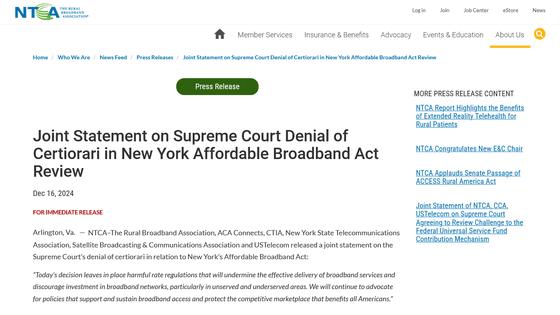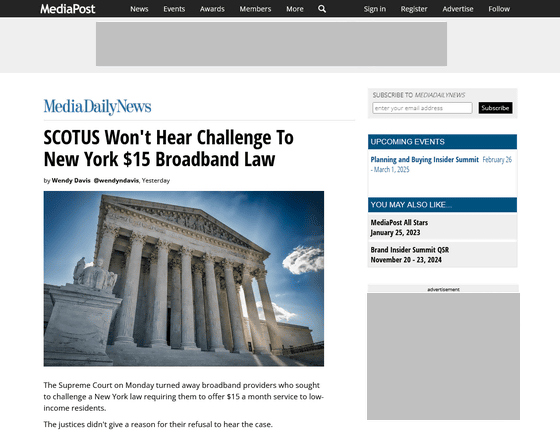Industry groups opposed the law to provide internet access to low-income earners for 2,300 yen per month, but the Supreme Court rejected it

The U.S. Supreme Court did not hear an appeal filed by a broadband lobbying group against a New York state law that requires Internet service providers (ISPs) to offer plans that are less than $15 a month to accommodate low-income consumers.
Joint Statement on Supreme Court Denial of Certiorari in New York Affordable Broadband Act Review | NTCA - The Rural Broadband Association

Big loss for ISPs as Supreme Court won't hear challenge to $15 broadband law - Ars Technica
Supreme Court quashes Big Telecom's attempt to avoid New York State's low-income price regulation | TechSpot
https://www.techspot.com/news/106001-supreme-court-refuses-hear-big-telecom-challenge-new.html
SCOTUS Won't Hear Challenge To New York $15 Broadband Law 12/17/2024
https://www.mediapost.com/publications/article/401923/scotus-wont-hear-challenge-to-new-york-15-broadb.html

In 2021, New York State enacted the Affordable Broadband Act (ABA), which requires ISPs to offer discount plans to make broadband available to low-income households. Specifically, ISPs were required to offer 25 Mbps plans for less than $15 per month and 200 Mbps plans for less than $20 per month (approximately 3,100 yen).
However, several broadband lobbying groups strongly opposed the bill, arguing that only the federal government can regulate broadband.
Although the district court agreed with the lobbying group's argument, the Second Circuit Court of Appeals ruled that ' the repeal of net neutrality regulations in 2018 does not prevent New York from regulating Internet services.' It overturned the ruling and expressed the view that New York state law is not problematic. Judge Alison Nathan of the Second Circuit wrote that 'the federal government cannot exclude states from regulating areas that it does not have the authority to regulate.'
The lobbying group then appealed to the Supreme Court, but the Court decided not to accept the appeal or hold a hearing.
In addition, the lobbying group argued that 'other states may follow New York's lead, which could lead to state-by-state competition.' However, New York Attorney General Letitia James countered, 'More than three years have passed since the ABA was enacted, and no other state has enacted a similar law.' She asked that the lobbying group's argument be dismissed as merely speculative.
Related Posts:
in Note, Posted by logc_nt







